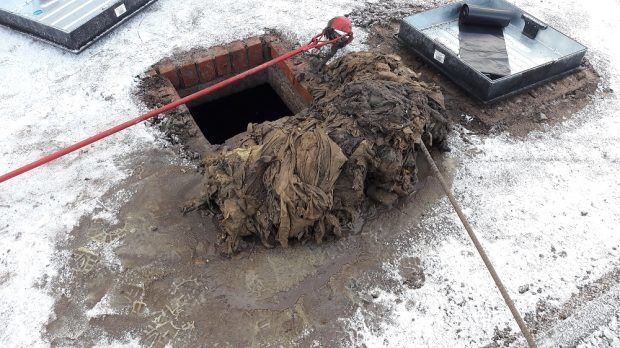Scottish Water has reminded homeowners not to flush wet wipes down toilets after they clogged up a Monifieth sewer.
Engineers from Scottish Water removed thousands of the items after they were called to a blockage in the Angus town earlier this month.
In total, the team filled five rubbish bags with wipes that had been dumped into a single section of sewer.
Scottish Water’s Cycle Campaign urges customers to use the “Three Ps rule” reminding them to flush only “pee, poo and toilet paper”.
A spokesman for Scottish Water said dispatching articles such as wipes, nappies or cotton buds down the toilet could cause drains to block.
Offending items should go in the bin, not down the toilet, even if the packaging claims they are flushable.
Sanitary items , condoms, incontinence pads, colostomy bags, used bandages and contact lenses are also on the no-no list.
Gavin Noble, Scottish Water sewer response team teader for Angus said: “The volume of wipes from this recent blockage in Angus is an ideal chance to remind customers of the consequences of putting inappropriate items down the toilet.
“Every year there are around 37,000 blocked drains and sewers across Scotland, which can cause flooding and pollute rivers, burns and coastal waters.
“Around 80% of these blockages that clog up the cycle are caused by either inappropriate items being put down the toilet, or fat, oil and grease being put down the sink.
“We believe the best way to tackle blocked drains and sewer flooding is to work together to help prevent blockages that can clog up the cycle in the first place and we would urge customers to follow the Scottish Water Cycle Campaign.”
Wet wipes are also known to contribute to the formation of “fatbergs” in sewers.
These are massive blockages caused by fat, wet wipes and nappies congealing.
Last year Thames Water revealed it had discovered a 250-metre long fatberg beneath Whitechapel in London.
It weighed the same as 11 double decker buses and could have caused raw sewage to spill onto the streets.
Workmen spent three weeks breaking up the mass with shovels and high-powered hoses.










